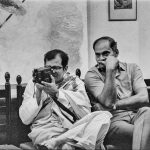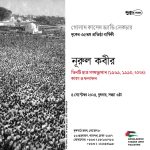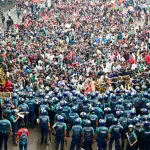

-
-
‘You are guilty because we say so.’
The imprisonment of Odhikar’s Adilur Rahman Khan and ASM Nasiruddin…
-
-
-
Statement of South Asian Independent Citizens on India’s Citizenship Amendment Act
Statement of South Asian Independent Citizens on India’s Citizenship Amendment…
-
-
2019 ICP Infinity Award: Shahidul Alam
Shahidul Alam is a Bangladeshi photojournalist, teacher, and social activist.…
-
Silence is not an option
Shahidul Alam is a Bangladeshi photojournalist, teacher, and social activist.…
-
-
-
-
-
The Guardians: Time Magazine Person of the Year 2018
This year brought no shortage of other examples. Bangladeshi photographer…
-
-
-
CITIZENS CALL FOR BANGLADESH TO RESPOND IN SUPPORT OF ICC PROSECUTOR’S SUBMISSION ON ROHINGYA DEPORTATION
As Bangladeshi individuals and organisations engaged in seeking justice for…
-
-
DEATH OF ROMEL CHAKMA: NHRC seeks Army?s explanation
DEATH OF ROMEL CHAKMA NHRC seeks Army?s explanation Muktadir Rashid…
-
HUMAN CHAIN: Protest against the murder of Photographer and Drik Employee 'Irfanul Islam'
????? ????????? ??? ????????? ? ?????????? ??? ??????? ?????…
-
-
-
-
Moving opening ceremony of "Kalpana's Warriors"
Remarkable: Noam Chomsky Absolutely stunning: Jess Worth. New Internationalist Magazine…
Latest Posts
Categories
- 1971
- Afghanistan
- Arts
- Bangladesh
- Capitalism
- Caretaker government
- Censorship
- China
- Chittagong Hill Tracts
- Chobi Mela
- Chobi Mela VII
- Coal
- Colonialism
- Consortium government
- Corruption
- COVID 19
- Crossfire
- culture
- Current News Photos
- Democracy
- development
- Disappearances
- disasters
- Drik and its initiatives
- Drik DNA
- Drik's Network Partners
- Drugs
- economy
- Education
- Elections
- Energy
- environment
- exploitation
- features
- Film
- Garments
- Gas
- Gender
- Genocide
- Global Issues
- Governance
- guimet
- Health
- History
- Human rights
- Humour
- Immigration
- Imperialism
- India
- Interesting sites
- Interviews
- Interviews and Features
- Islam
- Kalpana Chakma
- Killings
- Law
- lectures
- literature
- Major Features on Bangladesh
- Majority World
- media
- Media issues
- Migration
- Military
- mining
- Mir Jafar
- Monarchy
- Music
- My Photo Essays
- Nepal
- New Age
- New Media
- News Archives
- News Photo Archives
- Nuclear
- Occupation
- Oil
- Pakistan
- Partition
- Pathshala
- People
- Personal
- Photography
- Photojournalism
- Photojournalism issues
- photojournalist
- politics
- Poverty
- RAB
- Rahnuma Ahmed
- Religion
- Resistance
- Reviews
- Science
- security
- Shahidul Alam
- Sheikh Hasina
- short stories
- Sites of Drik and Pathshala photographers
- South Asia
- Southern Exposure
- Sports
- Sri Lanka
- surveillance
- Taliban
- Technology
- Terrorism
- Transport
- UK
- Uncategorized
- USA
- Violence
- War
- war on terror
- Water
- World
Tags
1971 Art Arts Bangladesh book censorship Chobi Mela Chobi Mela VII culture Death democracy Dhaka Drik education Elections exhibition Festival garments Gaza Genocide Governance history Human rights India Israel Journalism Law literature Majority World media Military Pakistan Palestine Pathshala Photography Photojournalism politics Rahnuma Ahmed resistance Shahidul Alam USA Violence Visual Arts War War Crimes



